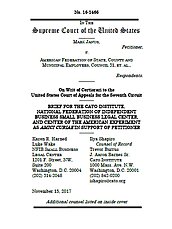Learn more about Cato’s Amicus Briefs Program.
After a year of contentious negotiations between Illinois Governor Bruce Rauner and the American Federation of State, County, and Municipal Employees, Council 31 (“AFSCME”), the parties reached a bargaining impasse in early 2016. As a result, the governor attempted to institute reforms over AFSCME’s objections, with the union then suing to thwart implementation. Caught in the middle of this power struggle was Mark Janus, a state employee who was compelled to subsidize the union’s efforts despite his personal opposition to its position (and non-membership). These forced exactions, known as “agency fees,” essentially provides workers in the 25 states that allow them, with a Hobson’s choice: Either sacrifice your First Amendment rights by funding political advocacy you may not like, or find another job.
The Supreme Court precedent allowing this unjust scenario, Abood v. Detroit Board of Education (1977), has become quite controversial. Twice in the past five years, the Court has explicitly questioned its central holding that mandatory agency fees are constitutional, and two terms ago the Court split 4–4 on the issue of whether to overturn Aboodoutright. Mr. Janus’s case finally provides the Court with a golden opportunity to restore the First Amendment liberties of the country’s public-sector workers. One of the union’s central arguments is that stare decisis should keep Abood in place. Stare decisis is a legal doctrine whereby courts are bound by their own precedents because of the reliance interests that have built up around them; sometimes it’s more disruptive to society to get a ruling right than to allow a possibly erroneous ruling to stand.
Because only constitutional amendments can check the Supreme Court’s constitutional rulings, however, and given that it’s increasingly hard to enact constitutional amendments, stare decisis is at its weakest when constitutional rights are being violated. In fact, when judges find that certain prudential factors weigh in favor of overturning precedent, judges have a duty to correct those past constitutional mistakes.
Abood is mistaken for several reasons. First, it improperly used the concept of “labor peace” to justify the infringement on public employees’ First Amendment rights. Before Abood, labor peace was completely unrelated to the First Amendment, instead being used to analyze whether Congress had power under the Commerce Clause to regulate labor disputes. But just because the Constitution gives Congress such authority, it doesn’t necessarily follow that Congress’s particular exercise of that power respects fundamental constitutional rights.
Moreover, Abood represents an anomaly in First Amendment jurisprudence. Abood’s confusion of powers and rights marked a significant departure from the Court’s prior jurisprudence, while subsequent decisions have rendered it no more than a remnant of an abandoned doctrine. There are also no reliance interests worthy of stare decisisprotection, as employees certainly don’t rely on being deprived of their freedom of speech and association and unions’ desire to keep the money flowing isn’t a constitutionally cognizable interest.
Finally, when courts have attempted to apply the Abood standard, it has proven to be simply unworkable. Due to the inherently political nature of public-sector unions, their collective bargaining efforts and political actions are practically indistinguishable. Even if one could make such a distinction, it would be meaningless in practice because money is fungible.
With a focus on stare decisis in general and the flawed labor-peace rationale specifically, Cato—joined by the National Federation of Independent Business and Center of the American Experiment—has filed an amicus brief seeking to finally end the extensive and pernicious infringements on core constitutional principles. After the Supreme Court hears Janus v. AFSCME in the new year, it should overrule Abood and restore workers’ First Amendment rights.



